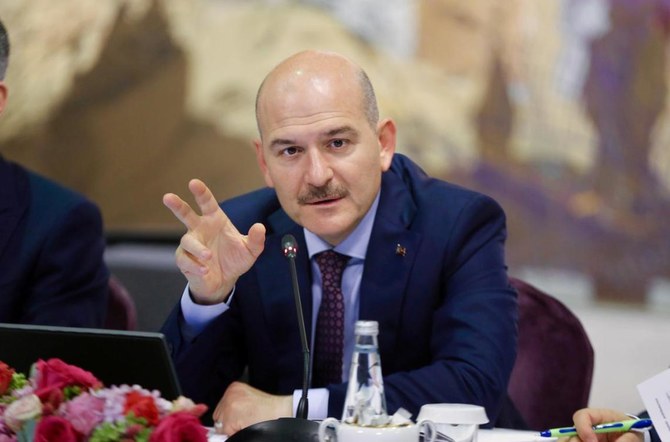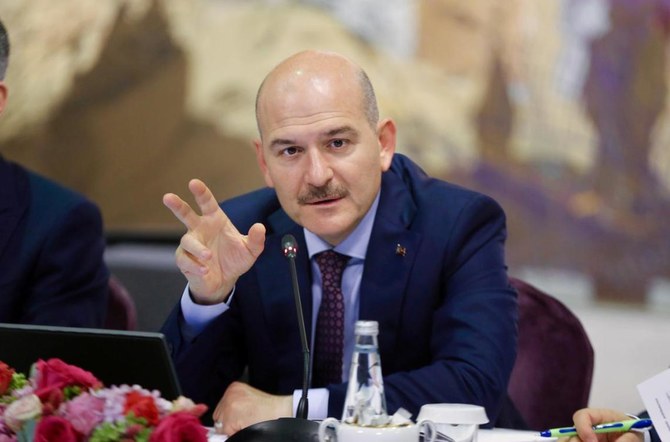ANKARA: Turkey has urged Europe to take back battle-hardened Daesh militants before it is too late.
Turkey’s Interior Minister Suleyman Soylu said on Saturday that Turkey would send captured Daesh members back to their home countries, and he complained about European inaction on the matter.
“Turkey is not a hotel for any Daesh terrorist,” he said.
Lorne L. Dawson, professor of religious studies at the University of Waterloo in Canada, said responsibility for the repatriation of foreign fighters lay with these nations, and it was the most humane way to address the plight of children of foreign fighters who should not suffer because of their parents’ actions.
“The hesitation to do so would appear to be primarily political, since the repatriation of foreign fighters will be criticized aggressively by more conservative elements in these countries,” Dawson told Arab News. He said that many domestic terrorists have been successfully reintegrated into their societies, but only after receiving sustained and appropriate counseling.
“In principle, then, the same should be true for many returning foreign fighters, and in fact there are many such returnees already present in most of the countries from which fighters left, and so far they have been linked to only a very few further terrorists acts,” he said.
Last Friday, Turkey detained two female Daesh terrorists and their children at the request of the Dutch Embassy in Ankara. One of the women was stripped of her Dutch citizenship over her membership of Daesh. Turkey will decide on the legislative steps to be taken against them, but the Netherlands wants them to stand trial in Syria or Turkey.
On Sunday, a senior Daesh official responsible for training camps was arrested in Turkey’s southern Osmaniye province.
The Brussels-based think-tank Egmont recently released a report showing that there are at least 430 Daesh prisoners in Syria with European nationality, along with some 700 children. France, Germany and Belgium have the highest numbers of foreign fighters who traveled to Syria to join Daesh.
However, after a series of terror attacks in Europe by Daesh members who returned home after being radicalized, European countries consider them “persona non grata” and insist on establishing an international court in Iraq for laying criminal charges.
About 800 Daesh members are claimed to have fled from the prisons they were kept in Syria in recent weeks. In late October, the deportation process to Turkey began of dozens of Daesh terror suspects with their family members, all Turkish nationals.
Nihat Ali Ozcan, a retired major now serving as a security analyst at Ankara-based think-tank TEPAV, said that international law requires that Turkey deports Daesh fighters who are captured within Turkish territories, but the problem begins when they are captured within Syria in zones that are outside of the Assad regime’s control.
“Some countries want them to stay there, and for instance the Netherlands began the process of stripping Daesh members with dual citizenship of their Dutch nationality to render them stateless,” he told Arab News.
But Ankara criticizes Western countries for resisting repatriation by revoking their citizenship: “It is not acceptable for us (to hear) ‘I stripped them of the citizenship, you take care of it.’ This is also irresponsibility,” Soylu said on Saturday.
Turkey sends foreign fighters caught in Syria to prisons located in the area of Turkey’s Operation Euphrates Shield and they are then sent back to their countries of origin.
“However, it is usually difficult to prove in a trial that they committed any crimes because convictions are usually based solely on a confession and no other supporting evidence,” Ozcan said.
The average sentence for returned fighters, in Turkey or in Western countries, has been five years’ imprisonment, resulting in security threats from those who cannot be efficiently rehabilitated.
Imprisonment has its own complications. Prison can become “an incubator of radicalization” in the words of the EU’s counterterrorism coordinator, Gilles de Kerchove, and imprisoned foreign fighters can also inspire their inmates.
For Dawson, the kind of programming required to rehabilitate many of the fighters is in place in many nations, especially in the West, and it merely needs to be repurposed from preventing violent radicalization to promoting the disengagement of foreign fighters.
Meanwhile, Turkey on Monday evening captured the 65-year-old sister of slain Daesh leader Abu Bakr Al-Baghdadi in northwestern Syria, where she was living with her family near the town of Azaz in Aleppo province. The area is part of the region administered by Turkey.




























